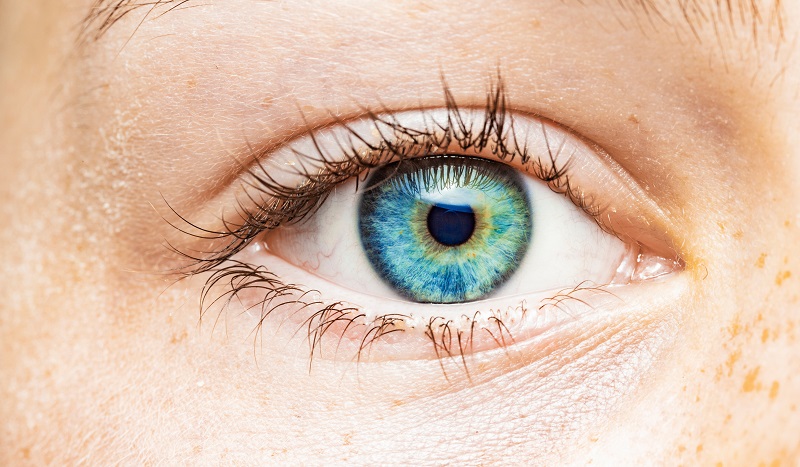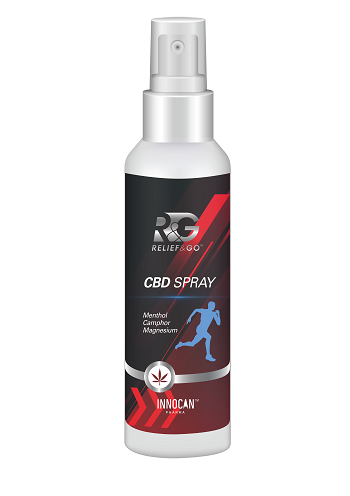Keratinocyte & Psoriasis: How Cannabinoids Help?

Psoriasis is a skin condition that manifests in patients in the form of long-term (chronic) disease. Symptoms of psoriasis include scaly patches that usually appear on the elbow, scalp, knees, buttocks, or trunk of the patient. These patches are red and itchy. Psoriasis is not a contagious disease.
Psoriasis usually appears in cycles. The disease symptoms appear and stay for a few weeks or months. They then subside or decrease in severity, only to reappear later.
Symptoms of the disease are different among different people. In some patients, the disease may manifest in the form of a few spots having a scaly texture similar to that of dandruff. In some, the scales can be huge eruptions spread across a large area.
The exact cause of psoriasis has still not been discovered. But it is believed that the skin condition is a result of a problem in the immune system. This abnormality in the immune system causes the skin to undergo regeneration that is abnormally fast.
This rapid cell regeneration causes the red patches and scales that are typical of plaque psoriasis, which is the most common type of the disease. About 90% of patients are diagnosed with plaque psoriasis.
The reason for the abnormal functioning of the immune system is still unclear. Experts believe that it could be a result of environmental and genetic factors.
Keratinocytes and psoriasis – What is the relation?
Keratinocytes are a type of cells found in the epidermal layer of the skin. The epidermis is the outermost layer of the skin. Keratinocytes are the dominant form of skin cells in this layer, with 90% of cells being keratinocytes.
Keratinocytes form in the deep base layers of the epidermis, known as the stratum basale. They gradually move upward to the stratum corneum, which is the final top layer of the epidermis. Here, it becomes part of the body’s primary defense system – the skin’s epidermal layer.
Other key functions of keratinocytes include minimizing heat and moisture loss from the body, immunomodulation, holding cell positions, and preserving the cohesiveness of epidermal cells.
Research on psoriasis shows that keratinocytes contribute to the occurrence of the disease as causal agents. A causal agent, in medical terminology, refers to a factor that is associated with the onset of a disease or its symptoms. Bacteria and trauma are some examples of causal agents.
The above research used mouse models to understand psoriasis and its causative factors. The study results begin stating that the well-known causative factors associated with psoriasis are inflammatory effector cells and immune cells. Inflammatory effector cells are those that activate and manage the inflammatory response. These cells also assist in repairing damaged tissues and removing potential threats.
Mouse models included in the research were based on the TN1P1 gene. Functional impairment of this TN1P1 gene is associated with psoriasis in humans, which is why the researchers used such gene models.
The research found that nonimmune cells, keratinocytes in the skin, in particular, contribute causally to psoriasis. The research also draws attention to the importance of keratinocytes as therapeutic targets to treat psoriasis.
Another research also reinforces the role of keratinocytes in causing psoriasis. This research states that psoriasis is a complex skin condition brought about by an interaction between different elements, including keratinocytes, immune cells, and several other cells residing on the skin.
The contribution of keratinocytes toward psoriasis has also been studied extensively by other researchers. One such study result explains how psoriasis could be caused, and the role of keratinocytes in the occurrence of the disease.
According to this study, the onset of psoriasis is brought about by an unknown antigen when it activates a T cell. A T cell is a type of white blood cell, also referred to as a T lymphocyte. The function of a T cell is to determine the specific reaction that the immune system needs to deliver to a foreign substance (medically called antigens) entering the body.
The activation of T cells elicits reactions from different cells, including inflammatory cells, activated T cells, and keratinocytes. All these cells secrete cytokines, leading to the formation of an array of the secretion.
Lesions, a typical manifestation of psoriasis, are a result of the hyper-proliferation of keratinocytes.
In another study, rodents were subjected to immunological alterations and genetic modifications. These changes caused hyperproliferative inflammatory skin conditions in the rodents. Such results are also being considered significant by researchers studying psoriasis.
Cannabinoids, keratinocytes, and psoriasis
There are studies suggesting that cannabinoids can treat psoriasis by acting as an inhibitor for the proliferation of keratinocytes. Cannabinoids are compounds that are pharmacologically active. Pharmacologically active compounds are those that have an effect, either beneficial or adverse, on living things.
These cannabinoids, called endocannabinoids, are present in animal and human bodies. Some popular endocannabinoids known to the world include AEA or anandamide and 2-AG or 2-Arachidonoylglycerol.
These endocannabinoids, in combination with cannabinoid receptors and the proteins responsible for the production and regulation, form the body’s Endocannabinoid System or ECS.
The ECS is responsible for a range of vital body functions, including nerve cell communications, reproduction, anxiety, learning, memory, eating, metabolism, and growth.
Then there are the phytocannabinoids, which are plant-made cannabinoids. Endocannabinoids made by the body are similar to the phytocannabinoids THC in structure and biology.
Phytocannabinoids are found only in the cannabis Sativa plant. THC or Tetrahydrocannabinol is the most popular phytocannabinoid compound. It is also the most abundant and active component of the cannabis plant. THC is psychoactive, meaning it imparts a change to an individual’s mood, behavior, feelings, and thoughts when consumed.
More about cannabinoids
The second compound that is most active in the plant is CBD or cannabidiol. This compound is not psychoactive. It is emerging as a promising compound in the medical world with its undeniable therapeutic benefits.
CBD has already gained prominence as a promising treatment for a range of illnesses, including anxiety, insomnia, and chronic pain. Dravet Syndrome and LGS (Lennox-Gastaut Syndrome), two of the most notorious forms of childhood epilepsy known to the medical world, are responding to CBD efficiently.
It should be noted that these two syndromes do not respond to standard anti-seizure medications. But studies found that the use of CBD reduced the number of seizures in patients. In some patients, seizures stopped altogether.
In patients with insomnia, CBD was able to reduce symptoms of sleeplessness. The cannabinoid also helped patients stay asleep.
Studies on animal models show that topical use of CBD is effective for pain and inflammation brought about by arthritic conditions. CBD is also proving efficient for preventing pain arising from neuropathic trauma and inflammation. These two types of pain are the most difficult to treat.
A significant factor contributing to the rising popularity of CBD among medical experts as well as patients is the absence of harmful side effects, including intoxication.
The safety of the cannabinoid and its treatment efficiency have encouraged a whole range of CBD-based products for skin health, wellness, and beauty.
Intensive research-backed product lines such as CBD Must and CBD Plus are making it easier for consumers to use CBD by delivering products in several forms. The pain relief product range includes pain relief roll-on, pain relief spray, body oil, and pain relief cream.
Products such as recovery lotion, sleeping mask, eye serum, and facial serum not only help address existing skin issues but also improve skin health when used regularly.
Products such as facial cream, glow oil, anti-aging facial serum, and face cream, in this range, are essential for any healthy skincare routine.
How cannabinoids help treat psoriasis?
Several studies have explored the efficacy of cannabinoids in treating psoriasis. In one such study, it was found that cannabinoids from the cannabis Sativa plant possess anti-inflammatory properties.
The study also found that cannabinoids can inhibit the proliferation of an array of tumorigenic cell lines. Some of these inhibitory effects are executed through cannabinoid receptors.
This study examined the efficacy of the plant cannabinoids CBD, THC, cannabigerol, and cannabinol in inhibiting the proliferation activity of a keratinocyte cell line prone to hyperproliferation. The study also explored the role of cannabinoid receptors in proliferation.
The study discovered that cannabinoid receptors could play a role in keratinocyte proliferation in certain situations (circumstantially). The contribution, however, is not significant.
The study concluded that cannabinoids can inhibit the proliferation of keratinocytes. Cannabinoids could, therefore, serve an important role in the treatment of psoriasis, the study concluded.
Another study provides deeper insights into the potential of cannabinoids as a treatment for psoriasis. This study explains multiple mechanisms through which cannabinoids can create an anti-proliferative effect.
The study found that in addition to inhibiting keratinocyte proliferation, cannabinoids have the ability to stimulate the vagal nerve, which is the body’s longest cranial nerve. These two actions lead to an increase in the release of acetylcholine. This is a compound that serves as a major neurotransmitter for the parasympathetic nervous system.
Another subsequent result of the above actions is immunomodulation, which modifies the response of the immune system. Immunomodulation is brought about by inhibition of the production of TNF protein by macrophages.
Macrophages are specialized cells that identify and eliminate harmful organisms, including disease-causing bacteria. They also give T cells access to antigens and initiate inflammation response by releasing cytokine molecules.
Researchers’ review of the study also opened up several other possibilities through which the therapeutic ability of cannabinoids could come into action. Inhibition of the processing of antigen, interactions between T cells and macrophage, and cytokine release are some of the possibilities unfolded by the review.
This study also sheds more light on the anti-proliferative effects of cannabinoids. It showed that cannabinoids are capable of inhibiting the proliferation of keratinocytes whether or not cannabinoid receptors are activated. These anti-proliferative effects could be brought about by the interaction of cannabinoids with the PPARγ receptor.
But another study showed the involvement of the receptor CB1 and its activation in keratinocyte proliferation.
Researchers suggest that further studies are essential to obtain conclusive facts regarding the mechanisms that bring about keratinocyte proliferation by cannabinoids.
Why treating psoriasis is important
Treating psoriasis is important not only because of the complications the disease can give rise to but also because of the social stigmatization that the patient may suffer.
Patients with psoriasis are susceptible to the following conditions:
- Obesity
- Psoriatic arthritis
- Type 2 diabetes
- High blood pressure
- Eye problems such as uveitis and conjunctivitis
- Cardiovascular diseases
Lesions and pruritus (itching) that arise as symptoms of psoriasis not only reduce the quality of life of the patient but also provoke unpleasant reactions from others. This can be mentally debilitating for patients. Prolonged exposure to such an environment can lead to low self-esteem and depression in patients.
In conclusion
Initial research on cannabinoids shows promising results. Researchers stress the importance of investigating further for conclusive evidence. The fact that these initial studies showed promising results is encouraging for psoriasis patients.
Cannabinoid-based products and treatments can serve as a feasible alternative for patients looking for relief in case conventional treatments have not worked for them. Cannabinoids, CBD in particular, is not psychotropic and is safe to use.
Pruritus or itching is one of the typical symptoms of psoriasis, which is not only bothersome but also a physically and mentally debilitating symptom. Study shows that the use of cannabinoids can be effective for pruritus.
Cannabinoids can reduce pruritus by activating receptors on the sensory nerve fibers present on the skin. Such nerve fibers also exist on keratinocytes and mast cells, which are also activated by cannabinoids- an action that is associated with itch reduction in psoriasis patients.
The introduction of CBD into your medical routine must be done only after consultation with your doctor. Many factors need to be considered before deciding on including cannabinoid-based formulations in your lifestyle.
Patient medical history and weight are some key factors considered. Dosage is also a key consideration.
It is crucial to choose only research-backed products. Check for ingredient labels on the product. Products that provide third- party lab testing results are preferable to those that carry manufacturer lab results.
More articles:










